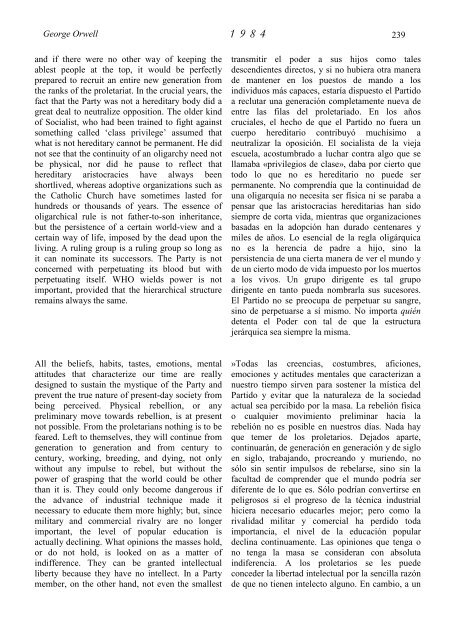Create successful ePaper yourself
Turn your PDF publications into a flip-book with our unique Google optimized e-Paper software.
George Orwell 1 9 8 4<br />
and if there were no other way of keeping the<br />
ablest people at the top, it would be perfectly<br />
prepared to recruit an entire new generation from<br />
the ranks of the proletariat. In the crucial years, the<br />
fact that the Party was not a hereditary body did a<br />
great deal to neutralize opposition. The older kind<br />
of Socialist, who had been trained to fight against<br />
something called ‘class privilege’ assumed that<br />
what is not hereditary cannot be permanent. He did<br />
not see that the continuity of an oligarchy need not<br />
be physical, nor did he pause to reflect that<br />
hereditary aristocracies have always been<br />
shortlived, whereas adoptive organizations such as<br />
the Catholic Church have sometimes lasted for<br />
hundreds or thousands of years. The essence of<br />
oligarchical rule is not father-to-son inheritance,<br />
but the persistence of a certain world-view and a<br />
certain way of life, imposed by the dead upon the<br />
living. A ruling group is a ruling group so long as<br />
it can nominate its successors. The Party is not<br />
concerned with perpetuating its blood but with<br />
perpetuating itself. WHO wields power is not<br />
important, provided that the hierarchical structure<br />
remains always the same.<br />
All the beliefs, habits, tastes, emotions, mental<br />
attitudes that characterize our time are really<br />
designed to sustain the mystique of the Party and<br />
prevent the true nature of present-day society from<br />
being perceived. Physical rebellion, or any<br />
preliminary move towards rebellion, is at present<br />
not possible. From the proletarians nothing is to be<br />
feared. Left to themselves, they will continue from<br />
generation to generation and from century to<br />
century, working, breeding, and dying, not only<br />
without any impulse to rebel, but without the<br />
power of grasping that the world could be other<br />
than it is. They could only become dangerous if<br />
the advance of industrial technique made it<br />
necessary to educate them more highly; but, since<br />
military and commercial rivalry are no longer<br />
important, the level of popular education is<br />
actually declining. What opinions the masses hold,<br />
or do not hold, is looked on as a matter of<br />
indifference. They can be granted intellectual<br />
liberty because they have no intellect. In a Party<br />
member, on the other hand, not even the smallest<br />
239<br />
transmitir el poder a sus hijos como tales<br />
descendientes directos, y si no hubiera otra manera<br />
de mantener en los puestos de mando a los<br />
individuos más capaces, estaría dispuesto el Partido<br />
a reclutar una generación completamente nueva de<br />
entre las filas del proletariado. En los años<br />
cruciales, el hecho de que el Partido no fuera un<br />
cuerpo hereditario contribuyó muchísimo a<br />
neutralizar la oposición. El socialista de la vieja<br />
escuela, acostumbrado a luchar contra algo que se<br />
llamaba «privilegios de clase», daba por cierto que<br />
todo lo que no es hereditario no puede ser<br />
permanente. No comprendía que la continuidad de<br />
una oligarquía no necesita ser física ni se paraba a<br />
pensar que las aristocracias hereditarias han sido<br />
siempre de corta vida, mientras que organizaciones<br />
basadas en la adopción han durado centenares y<br />
miles de años. Lo esencial de la regla oligárquica<br />
no es la herencia de padre a hijo, sino la<br />
persistencia de una cierta manera de ver el mundo y<br />
de un cierto modo de vida impuesto por los muertos<br />
a los vivos. Un grupo dirigente es tal grupo<br />
dirigente en tanto pueda nombrarla sus sucesores.<br />
El Partido no se preocupa de perpetuar su sangre,<br />
sino de perpetuarse a sí mismo. No importa quién<br />
detenta el Poder con tal de que la estructura<br />
jerárquica sea siempre la misma.<br />
»Todas las creencias, costumbres, aficiones,<br />
emociones y actitudes mentales que caracterizan a<br />
nuestro tiempo sirven para sostener la mística del<br />
Partido y evitar que la naturaleza de la sociedad<br />
actual sea percibido por la masa. La rebelión física<br />
o cualquier movimiento preliminar hacia la<br />
rebelión no es posible en nuestros días. Nada hay<br />
que temer de los proletarios. Dejados aparte,<br />
continuarán, de generación en generación y de siglo<br />
en siglo, trabajando, procreando y muriendo, no<br />
sólo sin sentir impulsos de rebelarse, sino sin la<br />
facultad de comprender que el mundo podría ser<br />
diferente de lo que es. Sólo podrían convertirse en<br />
peligrosos si el progreso de la técnica industrial<br />
hiciera necesario educarles mejor; pero como la<br />
rivalidad militar y comercial ha perdido toda<br />
importancia, el nivel de la educación popular<br />
declina continuamente. Las opiniones que tenga o<br />
no tenga la masa se consideran con absoluta<br />
indiferencia. A los proletarios se les puede<br />
conceder la libertad intelectual por la sencilla razón<br />
de que no tienen intelecto alguno. En cambio, a un


